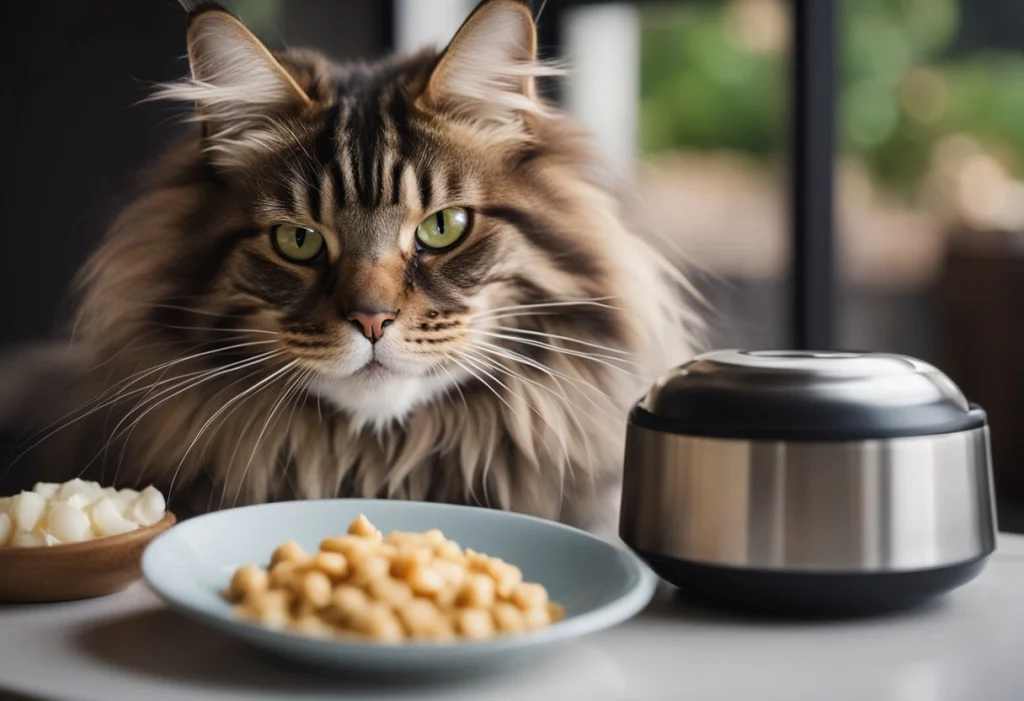Maine Coon Food Allergies: Understanding Causes and Solutions for Your Cat
By: Lana Koh

The information in this article is intended to educate cat parents and is not a substitute for veterinary guidance. In case of any concerns about your cat’s health, please talk with your veterinarian.
Maine Coon cats are beloved for their friendly nature and impressive size, but they can also face health challenges, including food allergies. Many Maine Coons may develop sensitivities to certain proteins such as beef or chicken, as well as grains like corn. Identifying these food allergies is crucial for maintaining their health and happiness.
Cat owners often notice signs of food allergies through symptoms such as gastrointestinal upset or skin irritations. Being aware of what foods to avoid can help prevent these issues from affecting the cat’s quality of life. Knowledge about common allergens is key to providing the right nutrition.
This blog post will explore the various food allergies that Maine Coons may suffer from and how to manage them effectively. By understanding these challenges, owners can ensure their furry companions receive the best possible care.
Also Read: Can Cats Eat Plantains?
Characteristics of Maine Coon Cats
Maine Coon cats are known for their impressive size and affectionate nature. They are often called “gentle giants” due to their large stature and friendly temperament. Understanding their characteristics is essential for potential owners.
Largest Domesticated Breeds
Maine Coons are among the largest domesticated cat breeds. Adult males can weigh between 13 to 18 pounds, while females typically range from 8 to 12 pounds. Their length can reach up to 40 inches, including their bushy tails.
These cats have a robust build, with broad chests and long legs. Their large size is not just for show; it has practical benefits. In cold climates, their thick fur and large bodies help them stay warm. This natural insulation is part of what makes them so unique.
Physical Stimulation Requirements
Maine Coons require ample physical stimulation to thrive. They are playful and intelligent, needing regular exercise to maintain their health. It is advisable to provide a variety of toys to keep them entertained.
Interactive play is particularly important. They enjoy games that mimic hunting, such as chasing feather wands or laser pointers. Regular playtime not only stimulates them physically but also mentally. This engagement helps prevent boredom and behavioral issues.
Grooming Maine Coons
Grooming is crucial for Maine Coons due to their long, dense fur. It is a high-maintenance breed that requires regular brushing to avoid matting and reduce shedding. Owners should aim to brush their Maine Coon at least two to three times a week.
During shedding seasons, daily grooming can help keep fur under control. It is also important to check their ears and trim their nails regularly. This careful grooming routine keeps their coats healthy and showcases the breed’s stunning appearance. Regular care reinforces the bond between owner and pet while ensuring the cat’s comfort.
Understanding Food Allergies in Maine Coons
Food allergies in Maine Coons can lead to various health issues. Identifying allergens and understanding symptoms is important for effective management. Blood work plays a crucial role in diagnosing and confirming allergies.
Identifying Common Cat Food Allergens
Maine Coons often struggle with certain proteins and ingredients in their diets. The most common allergens include:
These ingredients can trigger an immune response, leading to allergic reactions. It’s essential to read cat food labels carefully. Avoiding foods with these allergens can help keep Maine Coons healthy.
Symptoms and Diagnosis
The symptoms of food allergies in Maine Coons can vary. Common signs include:
- Weight loss
- Skin issues: Noticeable scabs or persistent itching
- Digestive problems: Vomiting or diarrhea
If these symptoms occur, a veterinarian should be consulted. Diagnosis often involves an elimination diet. This helps determine which food is causing the reaction. In some cases, food allergies can be mistaken for other issues, so careful observation is key.
Importance of Blood Work
Blood work is vital for diagnosing food allergies in cats. It can help identify specific allergens and rule out other potential health problems. Tests measure antibodies against certain foods, providing clear insights.
Regular check-ups and blood tests are essential for monitoring a Maine Coon’s health. If an allergy is suspected, prompt action can prevent serious complications. Early detection allows for a tailored diet that caters specifically to a Maine Coon’s needs.
Nutritional Needs of Maine Coons
Maine Coons have specific nutritional needs due to their large size and unique characteristics. To support their health, it is essential to understand the vital nutrients they require and the benefits of feeding them breed-specific cat food.
Essential Nutrients for Large Breeds
Maine Coons need a balanced diet rich in protein and healthy fats. Protein is crucial for their muscle development and overall growth. A diet high in chicken, turkey, or fish provides the necessary amino acids.
These cats also require carbohydrates for energy. Look for sources like brown rice or peas in their food. Additionally, omega-3 fatty acids support skin and coat health, which is vital for their long fur.
Fiber is also important to aid digestion and prevent diabetes-related issues. It helps regulate blood sugar, which is especially crucial for large breeds prone to obesity. A mix of these nutrients will keep Maine Coons healthy and active.
Breed-Specific Cat Food Benefits
Feeding Maine Coons breed-specific cat food can enhance their health and wellness. Such formulas are designed to meet the unique nutritional needs of large breeds. They often contain higher protein levels to support muscle mass.
Additionally, breed-specific foods typically include ingredients that promote joint health, which is vital for their larger frames. They may also have added vitamins and minerals to strengthen their immune systems.
Choosing breed-specific food can reduce the risk of common issues like obesity and diabetes. These diets are tailored to maintain optimal weight and overall health, ensuring that Maine Coons thrive as they age.
Preventing and Managing Allergies
Managing allergies in Maine Coons involves understanding parasite prevention and selecting appropriate hypoallergenic products. These steps can help reduce allergy symptoms and improve the overall health of the cat.
Role of Parasite Prevention
Parasites like fleas can worsen allergies in cats. These pests can cause skin irritation and allergic reactions, leading to discomfort. To prevent flea infestations, regular use of flea treatments is essential.
Finding a treatment tailored for Maine Coons is important, as their thick fur may require specific products. A vet can recommend effective options. Regular grooming also plays a significant role. Using the best cat brushes can help remove loose fur and dirt, minimizing the chances of fleas and other parasites settling in the coat.
Maintaining a clean living environment reduces the risk of parasites. Regular vacuuming and washing the cat’s bedding can significantly help control these pests.
Selecting Hypoallergenic Cat Products
Choosing the right cat food is crucial for managing food allergies. Hypoallergenic cat food often features limited ingredients or novel proteins that minimize allergic reactions. A diet low in grains can be beneficial.
It’s wise to consult a veterinarian about the best hypoallergenic options for Maine Coons. They can suggest tailored diets or even a hydrolyzed protein diet.
Along with food, selecting hypoallergenic cat products is vital. From grooming tools like a self-cleaning grooming kit to cleaners for the home, opting for non-allergenic options can help reduce allergy flare-ups.
By being proactive about these factors, cat owners can create a healthier environment for their Maine Coons.
Also Read: Can Cats Eat Pumpkin?
Lifestyle and Care for Allergy-Prone Maine Coons
Maine Coons require specific lifestyle adjustments to manage food allergies. Proper environmental enrichment and exercise are essential to keep these sweet-tempered cats happy and healthy, while also minimizing allergy symptoms.
Environmental Enrichment
Creating a stimulating environment is vital for Maine Coons, especially those with allergies. These cats thrive when they have plenty of activities and toys to engage their minds.
- Interactive Toys: Provide cat toys that encourage active play. Toys that mimic prey can satisfy their hunting instincts.
- Vertical Space: Maine Coons enjoy climbing. Adding shelves or cat trees allows them to explore their surroundings safely.
- Natural Elements: Incorporating safe plants can create a more engaging space. Be cautious with plants, as some can trigger allergies.
Regular grooming is also part of environmental care. It helps reduce the amount of allergens in their fur and keeps their coat healthy.
Read: Can Cats Eat Dragon Fruit?
Gentle Exercise and Play
Gentle exercise is important for maintaining the health of Maine Coons. Regular playtime helps them burn off energy without becoming overly stressed.
- Daily Routine: Establish a daily play routine, allowing for consistent physical stimulation.
- Gentle Activities: Opt for low-impact games, such as wand toys, which encourage interaction without excessive strain.
- Bonding Time: Engage with them during play. This builds a strong bond and helps them feel secure, which is important for their overall well-being.
Click To Read: Can Cats Eat Seaweed?
Frequently Asked Questions
Many Maine Coon owners have questions about food allergies in their cats. Understanding symptoms, ingredients to avoid, and management strategies can help owners provide better care for their pets.
Final Thoughts
Maine Coon cats, known for their gentle and affectionate nature, can face food allergies that impact their health and well-being. Identifying common allergens like beef, chicken, and grains, along with recognizing symptoms such as skin irritations and digestive issues, is crucial for effective management. By understanding their unique nutritional needs and opting for hypoallergenic or breed-specific diets, owners can ensure their Maine Coons lead a healthy, comfortable life.
Proactive care, including regular grooming, parasite prevention, and environmental enrichment, further supports allergy-prone Maine Coons. With proper attention to diet and lifestyle, these majestic cats can thrive, showcasing their playful and loving personalities while minimizing allergy-related discomfort.

About the Author
Lana Koh
Lana is a passionate cat lover with years of experience caring for her feline companions. As a dedicated volunteer at animal shelters, she’s gained valuable insights into the world of cats. Lana channels her love and knowledge into writing informative and engaging articles for fellow pet owners, covering topics like cat health, nutrition, grooming, behavior, and the special bond we share with our feline friends.
